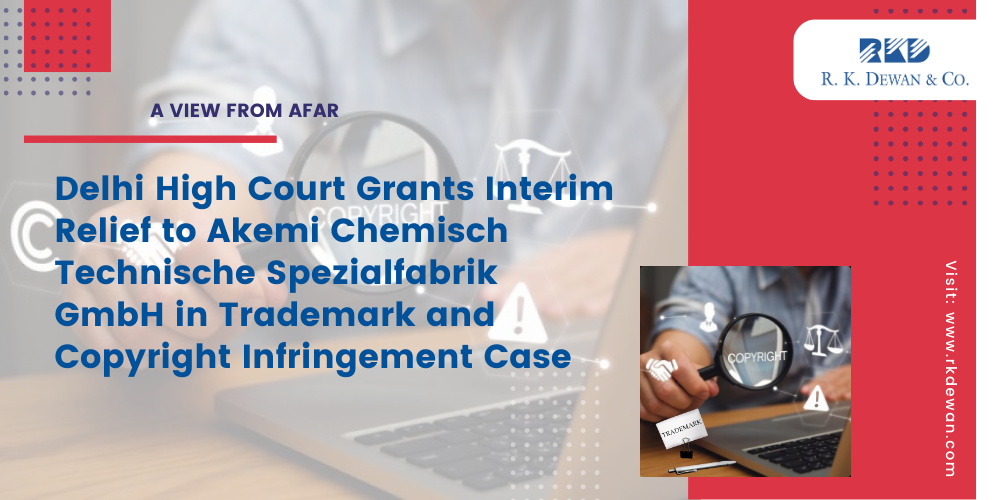Trademark and Copyright Infringement: A Threat to Brand Integrity
Intellectual property protection plays a crucial role in preserving brand integrity and market reputation, particularly in industries where counterfeit products pose a significant threat. The ruling by the Hon’ble Delhi High Court in favor of AKEMI Chemisch-technische Spezialfabrik GmbH (“Akemi”) underscores the commitment of Indian Courts to safeguard Trademark and Copyright rights against counterfeiters. In this case wherein Akemi was represented by R K Dewan & Co (“RKD”), resulted in a critical ex-parte ad-interim injunction against the Defendant, restraining them from manufacturing and selling counterfeit products under Akemi’s trademarks “AKEMI” and “AKEPOX.”
Akemi Chemisch Technische Spezialfabrik GmbH has been a global leader in stone and automotive chemicals for over 85 years. Its products, developed using polyester, epoxy, polyurethane, and epoxy acrylate, have been extensively used by professionals worldwide for bonding, filling, and repairing. Founded in 1933 and rebranded as “Akemi” in 1952, the Plaintiff has cultivated an exceptional market reputation in the natural stone sector. The trademarks “AKEMI” and “AKEPOX” have been legally protected under trademark law, ensuring their exclusivity in India, where the Plaintiff has been exporting since the 1990s.
Akemi discovered that the Defendant was clandestinely manufacturing and distributing counterfeit products under the Akemi’s trademarks in New Delhi and surrounding regions. An independent investigation in June 2024 confirmed these activities. Additionally, it was also revealed that the counterfeit products were of substandard quality, posing a significant risk to consumers and tarnishing the Akemi’s well-established reputation.
We do not claim any copyright in the above images. The same have been reproduced for academic and representational purposes only
The Defendant’s use of the impugned trademarks and labels was identical to the Akemi’s registered trademarks, both visually and phonetically. Furthermore, the Defendant also replicated Akemi’s distinctive artistic trade dress and label design, thereby infringing upon its copyright. The counterfeit goods bore the marks “AKEMI” and “AKEPOX 5010,” which were deceptively similar, if not identical, to the Plaintiff’s genuine products.
In response, Akemi filed a suit under Sections 134, 135, 29, and 27 of the Trade Marks Act, 1999 (pertaining to trademark infringement, passing off, and remedies for enforcement of rights); Sections 51 and 55 of the Copyright Act, 1957 (for copyright infringement); & sought reliefs including a permanent injunction, restraining the Defendant from further infringement, passing off, and unauthorized use of the Plaintiff’s trademarks; in addition to taking charge of infringing goods, damages, and rendition of accounts.
Recognizing the imminent threat posed by the Defendant’s counterfeiting operations, the Hon’ble Delhi High Court, in its order granted ex-parte ad-interim relief in favour of Akemi. The key rulings included:
- Injunction Against the Defendant: The Defendant was restrained from manufacturing, selling, distributing, or dealing in products bearing the infringing marks “AKEMI” and “AKEPOX.”
- Appointment of a Local Commissioner: The Court appointed a Local Commissioner to conduct a search and seizure operation to take charge of counterfeit goods and collect evidence of infringement.
This ruling reinforces the robust protection available for Trademark owners in India and highlights the judiciary’s proactive approach in combating counterfeit activities. The order serves as a crucial precedent for global brands seeking to enforce their intellectual property rights in India, particularly in industries vulnerable to counterfeiting & serves as a strong deterrent against counterfeiters and reinforces the importance of vigilant IP enforcement to safeguard brand reputation and consumer trust. Copyrights lawyers in India play a pivotal role in navigating such complex litigation, ensuring rights holders receive timely and effective redressal.



